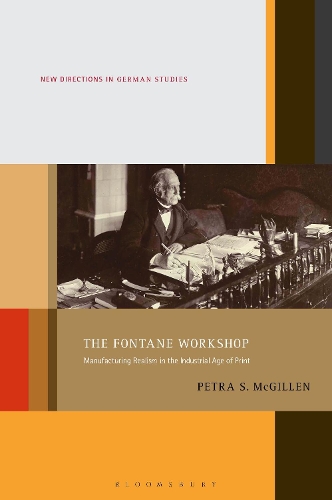
The Fontane Workshop: Manufacturing Realism in the Industrial Age of Print
(Paperback)
Publishing Details
The Fontane Workshop: Manufacturing Realism in the Industrial Age of Print
By (Author) Prof. Petra S. McGillen
Bloomsbury Publishing PLC
Bloomsbury Academic USA
28th January 2021
United States
Classifications
Professional and Scholarly
Non Fiction
Literary studies: fiction, novelists and prose writers
838.709
Physical Properties
Paperback
328
Width 138mm, Height 210mm, Spine 18mm
420g
Description
Winner of the Aldo and Jeanne Scaglione Prize for Studies in Germanic Languages and Literatures (Awarded by the MLA) With an innovative approach that combines material media history, media theory, and literary poetics, this book reconstructs the great German writer Theodor Fontane's creative process. Petra McGillen follows Fontane into the engine room of his text production. Analyzing a wealth of unexplored archival evidence--which includes a collection of the author's 67 extant notebooks, along with an array of other "paper tools," such as cardboard boxes, envelopes, and slips--McGillen demonstrates how Fontane compiled his realist prose works. That is, he assembled them from premediated sources, literally with scissors and glue, in an extraordinarily inorganic and radically intertextual manner that turned "writing" into a process of ongoing remix. By exploring the far-reaching implications of Fontane's creative practices for our understanding of his authorship, originality, and poetics, this book opens up a completely new way to think about his works and, by extension, 19th-century literary realism. This conceptualization of authors' notebooks as creative tools makes a substantial contribution to scholarship on the history of writing media in several disciplines, from German studies and literary studies to media history, and to our understanding of the relationship between mass media and literary creativity in the late 19th century.
Reviews
Written with stylistic precision, The Fontane Workshop is as entertaining as a work of literary scholarship can be. This monograph combines a wealth of archival material with historical background (Fontanes correspondence-based lending library is just one highlight of many) to offer a new perspective not only on Fontane, but on production practices and media shifts in the era of bourgeois realism more generally. * Monatschefte *
Petra McGillen has produced a brilliant study, rich in material and wonderfully written, that will change the way we look at Fontane. * Zeitschrift fr Germanistik *
Never before has the phenomenology of Fontanes working materials been so exhaustively and persuasively interpreted, contextualized, and related to his authors profile a profile which thereby takes on a completely new appearance. * Fontane Bltter *
The titles in Bloomsbury's "New Directions in German Studies" series are not for beginners. This volume deals with the creative process of the great German 19th-century novelist Theodor Fontane (181998), and it is as rigorously scholarly as its predecessors in the serieswhich include, most recently, Curtis Swope's Building Socialism: Architecture and Urbanism in East German Literature, 19551973 (CH, May'18, 55-3144) and Susan Gustafson's Goethe's Families of the Heart (CH, Dec'16, 54-1616). McGillen (Dartmouth) focuses on the more arcane aspects of text in Fontane's development; she provides a close examination of Fontane's 67 notebooks along with the detritus carefully left behind, which she describes as "paper tools." Other critics have examined authors' notebooks in order to explain their creative process, but few have been as meticulous as McGillen. In order to follow the construction of Fontane's creative thought, the reader will need some background in literary history, theory, and poetics. But as difficult as the theory may be, the writing is transparent, the critical view clear and easy to follow. A knowledge of German will be useful, but the many translations help enormously. The bibliography will be valued by Germanists and advanced students of literary theory. Summing Up: Recommended. * CHOICE *
The most interesting book on Fontane to come out this anniversary year. * Frankfurter Allgemeine Zeitung (Bloomsbury translation) *
Deftly combining 19th-century media history and a wealth of previously unexamined archival materials, The Fontane Workshop offers a fresh and fascinating new interpretation of a canonical author and a key moment in German literary history. Recognizing Fontane as the compiler he was not only transforms our understanding of his authorship and the sources of his unique success, but also invites us to reconsider more generally the complexities of literary production in the industrial age of print. * Matt Erlin, Chair and Professor of German, Washington University in St. Louis *
Until now, Fontanes novels have barely ever been considered in light of the process by which they came to be written. The rubric of poetic realism defined the horizon of expectations and obscured the view of the workshop in which the work took shape. In her fascinating study, Petra McGillen now introduces us to Fontane the manufacturer, collector of cuttings, maker of lists, cut-and-paste raconteur, remix artist, and media wizard. * Heike Gfrereis, Head Curator, Deutsches Literaturarchiv Marbach and Honorary Professor, University of Stuttgart, Germany *
Combining analytic approaches from the schools of book history, media theory, and practice-driven examinations of literary production, McGillens important study reevaluates Theodor Fontanes works by focusing on the material conditions of his writerly workshop. The book offers fascinating insights into Fontanes methods of compiling, note-taking, and collecting, all ways of gathering information that anticipate modern forms of crowd-sourcing and networking. Fontanes Realist poetics thus produce a media-based effect and reveal the modernity of 19th-century modes of writing. * Anette Schwarz, Associate Professor of German Studies, Cornell University, USA *
Author Bio
Petra S. McGillen is Assistant Professor of German Studies at Dartmouth College, USA.
